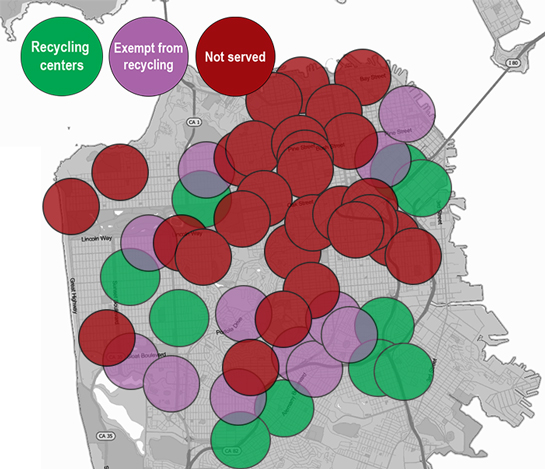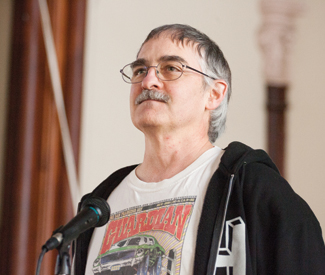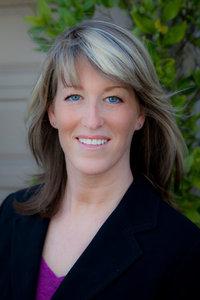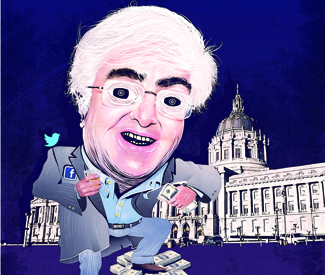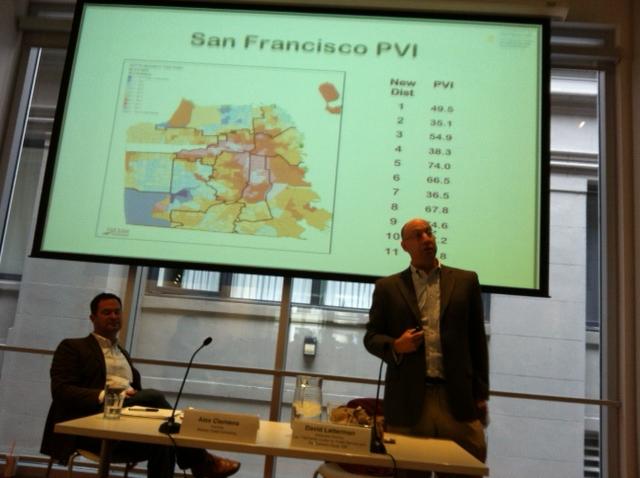[An abridged version of this article appears in this week’s Guardian]
Longtime Bay Guardian Editor Tim Redmond left the newspaper last week in a dispute with its new owners over personnel changes and his autonomy within San Francisco Print Media Company, which also includes the San Francisco Examiner and SF Weekly.
Redmond led the Guardian newsroom for most of his 31 years with the newspaper and engineered last year’s sale to Todd Vogt and a Canadian ownership team. As part of that sale — which Redmond cast to staff as saving the Guardian from bankruptcy and closure — Bruce B. Brugmann and Jean Dibble, the couple who founded the Guardian in 1966, retired from the paper, its Potrero Hill office building was sold, and the Guardian moved into the Examiner’s downtown office in June 2012.
Redmond was the Guardian editor and publisher, the name at the top of our masthead and the person solely in charge of Guardian operations, and he told staff he had been guaranteed full autonomy by the new ownership, which was important to the Guardian staff. As such, he resisted Vogt’s periodic efforts to control the newspaper, including early threats to fire City Editor Steven T. Jones for unspecifed reasons, which Vogt had mentioned to Redmond, directly to Jones, and to Guardian writer Rebecca Bowe prior to her return to the Guardian at the beginning of this year.
Nonetheless, Vogt did make some successful incursions on the Guardian’s independence, initially by encouraging layoffs, later by interfering with Guardian endorsements in the November 2012 election.
On Oct. 26, 2012, without consulting Redmond, Vogt named Examiner Editor Stephen Buel to be vice president for editorial overseeing both newspapers, announcing that Buel would “oversee the editorial direction, content, tone and voice of our newspapers and web sites.”
Shortly after the purchase of the longtime Guardian rival SF Weekly two months later, Vogt similarly appointed Weekly writer Erin Sherbert to oversee online communications at all three papers.
Neither Buel nor Sherbert directed or reviewed any Guardian editorial content prior to publication, although some stories from the Guardian and the Weekly began to appear in the Examiner’s newspaper and website, often edited by Examiner editors but giving credit to their original source.
The Guardian’s weekly revenues continued to remain flat or decline, at least partially because of the departure of two of the Guardian’s commission-based advertising representatives, positions which remain unfilled. The San Francisco Print Media Company then instituted a new system in which ad reps would try to sell into all three papers, which particularly hurt the Guardian’s bottom line during the run-up to the SF Weekly’s large Best of San Francisco, published May 29. The Guardian’s sales staff remains significantly smaller than that of the other two publications.
Vogt, Buel, and Chief Financial Officer Pat Brown began a conversation with Redmond about the need to cut expenditures, focusing on the newsroom, which until June 14 had seven full-time Guardian staffers and a part-time art director, who also works for the Examiner.
Redmond expressed a willingness to make cuts while also emphasizing the need to hire more ad reps to boost revenue, Redmond and Buel both told us. “He made it very clear that we need more salespeople,” said Buel, who also told us that he supported Redmond’s stance with Vogt and Brown that he should be allowed to choose where the cuts would be made.
“Todd and I were in the middle of difficult and ongoing negotiations for how to cut costs. My position is that it is entirely appropriate for the owner to ask us to cut costs, and then I would come back with a plan,” Redmond told us.
Instead, on June 12, shortly before Redmond left the office to moderate a well-attended forum that he had organized on Plan Bay Area and San Francisco’s long-term growth policies (see related story), Vogt called Redmond and Buel into Brown’s office and demanded he lay off three specific people in the newsroom (ironically, not including Jones, whose work Vogt has come to publicly praise in recent months) as soon as the current issue is complete. That would have cut in half the number of writers and editors working under Redmond, making it difficult to put out a paper.
“To have me lay off three people by name is not acceptable,” Redmond told us, holding firm that he would cut expenses but that he wouldn’t let Vogt micromanage the Guardian in that fashion. Redmond informed Buel of his decision on June 13 and sought to meet with Vogt, who wasn’t in the office that day.
“Tim told me in no uncertain terms that he couldn’t do it,” Buel told us. “He was civil and cordial and adult about it, but he was very clear he was going to leave the Guardian” rather than be forced to implement that decision. Buel then conveyed to Vogt that Redmond had offered to resign rather than making the cuts.
The next night, Redmond and Vogt exchanged a series of emails in which Redmond repeatedly offered to leave and help create a smooth leadership transition and Vogt repeatedly insisted that Redmond make the cuts and/or clarify whether he was resigning.
It culminated shortly before midnight with Vogt telling Redmond that his resignation had been accepted — to which Redmond responded the next morning that he hadn’t offered his resignation — and that he was barred from returning to the office or speaking for the Guardian.
Vogt’s explanation
Guardian staffers arrived to the office earlier than usual as requested, for a 9:30am meeting Vogt had called shortly before midnight, but Vogt was absent. The meeting commenced around 10:15am, with Vogt phoning in from Canada for his first meeting exclusively with Guardian staff.
“I’ve got a bunch of apologies to make,” he began, explaining that he was flying to Canada for his six-year-old son’s school assembly. “I’m embarrassed that I’m not there, but I’m more embarrassed that I contemplated missing my son’s grade one graduation and school play.”
He went on to describe his email exchange with Redmond the night before. “I accepted his resignation as editor of the Guardian, effective immediately,” Vogt said. “I didn’t ask for his resignation, I didn’t want him to resign. But it was Tim’s decision.”
“For 12 months, we let — I let — Tim run the Guardian pretty much hands off,” he said, allowing that on a few seldom occasions, “I actually made demands, some of which Tim listened to, some of which Tim disregarded.” Vogt went on to say that he, Redmond, Buel, and Brown had been meeting to discuss “very serious and significant changes” at the paper, which would have included staffing cuts.
“Up until yesterday at 4:30, I was under the impression … that not only was Tim on side with those changes, Tim had actually recommended some of those changes, both staffing and otherwise,” Vogt said. “So I’m not exactly sure what occurred, but whatever occurred yesterday that made Tim have a change of heart is really irrelevant at this point. So, uh, again you all know Tim, and you have known Tim longer than you’ve know me, and whether you choose to believe what I just said, at the end of the day, it doesn’t really matter.”
Vogt went on to say, “Last month, it became painfully apparent that we had to make some radical changes to the Guardian. Some of the changes … were going to affect the editorial tone and position of the Guardian. We weren’t going to do anything crazy, like Philip Anschutz the Guardian,” referring to the Examiner’s former right-wing owner, “but we definitely were going to look to make some changes, because obviously what we’ve been doing … isn’t resonating with advertisers, and I honestly don’t believe it’s resonating with readers.”
He went on: “Whatever you heard yesterday with respect to layoffs, or freelancers no longer writing for the paper, all of those decisions that had been made collectively between Tim, myself, Steve, and Pat are off the table.”
Going forward, he said, “I’m going to look to Marke [Bieschke, appointed interim editor], and Dulc [Vice President of Advertising Dulcinea Gonzalez], and Steve [Buel] to quickly come up with a plan of what we need to do … to get the Guardian back on solid financial and, and sort of ideological footing, in the community. I know some of you heard that certain positions were going to be eliminated and there’s likely going to be pissed off people and hard feelings, and for that I’m sorry. And I’m not saying… that there won’t be layoffs. There may well indeed be.”
Then Vogt opened up the discussion for “Questions, comments, you can tell me to go fuck myself. Whatever it is, now is the time.”
Jones asked about how Redmond’s departure would be presented to the community, and what he meant by the change in editorial tone. “No disrespect to Bruce [Brugmann], but I think the editorial changes that need to happen at the paper need to reflect sort of, progressive — the new progressive — movement, the new progressive values,” Vogt responded. “The feature that Tim wrote two weeks ago [on the future of planning in San Francisco], that’s the kind of stuff that I think the Guardian should be. But if anybody around the table is looking or hoping that I’m the guy who’s going to provide the editorial vision of what the Guardian’s going to be, we’re in serious shit. I’ve lived in the city for 18 months, and I’m the last guy who should be opining on what the Guardian ought to be.”
Shrinking the Guardian
Guardian Culture Editor Caitlin Donohue severed ties to the newspaper shortly after the meeting. “I was just shocked that I was being told by intercom to disbelieve my editor and mentor of four years,” Donohue said when asked for her response to the meeting.
In that meeting, Donohue accepted a voluntary layoff. “After the various idiocies of last week, I realized it was time to hit the ejector button, and started putting my energies towards building new media that actually had a chance of success,” Donohue explained later via email.
With regard to Redmond’s ouster, Donohue said, “Getting rid of Tim, and the others they told him were next, is part and parcel of the company’s slice and dice attitude to their acquisitions. You can’t run that paper after cutting nearly 50 percent of its editorial staff — or a good one, at least.”
On Monday, Gonzalez also resigned from the Guardian, effective July 1, further reducing its advertising staff. She had no comment for this story, but Vogt called her departure “a huge blow.”
Vogt still insists that Redmond helped develop the plan to lay off two of the three people they discussed. Buel also said that particular staffers had been discussed in meetings among the four of them, although Buel said only supported two of the three cuts that Vogt insisted upon.
“He fully supported two of the three cuts until Thursday,” Vogt said of Redmond. “Suddenly something happened on Thursday. I don’t know whether it was a conscience thing, or a change of heart or mind.”
Redmond denies that he supported any specific layoffs, telling us that he insisted on being the one to make decisions on who worked for the Guardian and that he wanted to broadly review the Guardian’s expenses, including what the company was charging it for rent and printing the paper.
“Tim was simply more interested in the editorial side and the Guardian needed some business leadership,” Buel said, noting that he conveyed that assessment to both Redmond and Vogt a couple months ago, not intending to be named publisher of the Guardian himself last week. “I said that not at all envisioning I would be the person to do that.”
Redmond said that he was cut out of the loop on decisions that Vogt and other managers made to restructure the advertising sales team to have reps selling into all three products, which sources who have worked in the department say created dysfunction and diverted energies that hurt Guardian ad sales.
“They never asked me how the ad department should be set up,” Redmond said.
And while Redmond and Buel both say he strongly advocated for more employees to be dedicated to selling the Guardian, Redmond found himself playing the same role he had played as executive editor under the previous ownership: reacting to the paper’s financial fortunes by cutting costs.
The Guardian had seven full-time staff writers when Jones was hired in 2003, which Redmond whittled down to just one by the time the paper was sold, despite the Guardian winning a multi-million-dollar lawsuit against the SF Weekly and the chain that owned it, Village Voice Media, for unfair competition and anti-competitive pricing.
“I recognized in May that Guardian sales were down and I was not opposed to the idea that we had to cut costs,” Redmond told us, later adding, “I came back with two plans. One, sell me the Guardian, or two, tell me how much I need to cut.”
Vogt didn’t accept either idea, insisting Redmond lay off the staffers that he had identified. Whether that final standoff is seen as a straight business decision, a personality conflict, or a question of the autonomy of Redmond and the Guardian, it’s certainly true that it was the last in a series of conflicts between the two men.
Internal friction
Friction between Vogt and the Guardian’s newsroom had been building for some time, centered around a couple of issues: payment of tens of thousands of dollars in debts to freelance writers that Vogt assumed when taking over the Guardian, and Redmond’s authority as editor/publisher of the Guardian.
While the terms of the Guardian’s sale to Vogt’s group haven’t been made public, sources say there were a couple areas of disagreement that delayed Vogt’s acceptance of his responsibility to pay the freelance debt, although that was settled earlier this year.
Guardian staffers who work directly with the freelancers consistently complained about the unpaid debt and the difficulties it created in working with writers, and Redmond insisted that he was trying to faciltate payment but that there was nothing he could directly do to help. A plan was supposedly developed to pay the debts, but as of today, the bulk of the past freelance debt remains unpaid.
“We didn’t have a ton of free money to pay the debt owed under Bruce’s leadership,” Vogt told us, adding that the company has been slowly paying off that debt, including expediting payments to key freelancers “when Tim said it was important.”
Vogt also began complaining to Redmond about specific writers in the paper that he didn’t like. “I had made demands about certain freelancers, ‘I don’t want so and so writing for the paper,’ and they were still in the paper.”
Redmond maintains that it was his decision what appears in the Guardian, not Vogt’s, and that he resisted the owner’s suggestions to fire certain writers, including L.E. Leone, the Guardian’s longtime Cheap Eats columnist — who often departed from restaurant coverage to touch on an array of social topics, including her own MTF gender reassignment process — who transitioned into a sports columnist earlier this year.
“I think it was the coolest thing in the world that we had a transgender sports columnist who was one of the best writers in San Francisco. Todd strongly disagreed,” Redmond told us. In the wake of Redmond’s ouster, Leone resigned from the Guardian on June 15.
A perhaps more significant conflict over control of the Guardian came during the fall election when Vogt clashed with Redmond and Jones over the supervisorial endorsement in District 5. First Vogt opposed endorsing Julian Davis, but ultimately made it clear that it was the Guardian’s call. After Davis was hit with new sexual misconduct allegations and responded badly to the developments, the Guardian revoked the Davis endorsement.
We then contemplated endorsing Christina Olague — who had regained progressive favor after defying Mayor Ed Lee on a couple of high-profile issues — but Vogt refused to allow it.
“He told me his newspapers would not be endorsing Christina Olague,” Redmond said, a point that Vogt confirmed, explaining only that he didn’t want to revisit the D5 endorsement after the Davis debacle.
Redmond said that Vogt then “threatened to fire me” for running a pro-Olague op-ed from longtime queer activist Cleve Jones, despite Redmond’s explanation that the Guardian oftens runs guest editorials during election season supporting candidates other than those endorsed by the Guardian.
In fairness, Vogt wouldn’t be the first Guardian owner to buck the newsroom on a political endorsement. In the 2003 mayor’s race, Brugmann at the last minute overrode the consensus endorsement choice of Tom Ammiano, instead insisting the paper endorse Angela Alioto, although an apologetic Redmond allowed staff to print a dissenting endorsement in favor of Ammiano.
Meanwhile, both Vogt and Buel have issued public statements following Redmond’s ouster pledging to keep the Guardian operating as it always has.
Buel insists that he and Vogt have both allowed the Guardian to remain an independent, progressive voice throughout their tenure — something that he said is clear from the Guardian’s strong and critical coverage of corporate power this year — and they intend to maintain that approach going forward.
“I think its editorial independence has remained intact,” Buel told us, assuring Guardian readers that would continue even without Redmond at the helm. “All I’m saying is keep reading and see if we live up to what I’m saying.”
Tim’s San Francisco
The day news of Redmond’s firing hit the Guardian newsroom, the ousted editor created a website titled “Tim’s San Francisco” on blogspot.com and posted a statement about what had happened.
“Hi, my friends, all the people I love and care about in this city. I’m sad to announce that after 30 years, I have left the Bay Guardian,” he wrote. “I am proud of all the work that we did over those years, but sadly, it has come to an end.”
After briefly explaining the details of his departure, he added, “The good news is that Blogger is free, and I will fancy up this blog in the next couple days, and I will continue to present perspectives and news about progressive San Francisco.”
In the days that followed, online comments on Facebook, sfbg.com, and Redmond’s new blog demonstrated an outpouring of support from community members.
“The Bay Guardian has been a venerable source for progressive talk (and organizing) in San Francisco and the Bay Area for years,” Media Alliance wrote. “Despite the paper’s shrinking physical presence, it maintained an influential role in City Hall politics and the Bay Area progressive movement, largely thanks to Redmond’s editorial presence.”
Christopher Cook, a progressive journalist and former city editor at the Bay Guardian, expressed his outrage over Redmond’s ouster in a Facebook post and had issued a call to action, writing, “As the paper would say, let’s give them hell.” Later, he wrote, “Folks, a critical progressive institution has been bought out and now gutted by this aggressive media corporation. Where’s the protest and uproar?”
Brugmann also offered this statement to the Guardian: “Tim came to the Guardian 30 years ago as a reporter, specializing in politics and investigative reporting. Tim soon developed, in my estimation, into one of the finest all around editors in the country. He was largely responsible for making the Guardian the major progressive voice in San Francisco, a major force in Freedom of Information and public access issues throughout the state, and a national model for the alternative press throughout the country.”
Redmond said he’s been engaging in lots of discussions with the Guardian’s community in recent days, exploring whether Vogt may still be persuaded to sell the paper, or looking at ways to start a new media vehicle for the Guardian’s community.
“I do have to give Todd credit for buying the Guardian and keeping it alive this year,” Redmond said, adding that he was disappointed that Vogt chose to “basically destroy the newsroom” rather than taking him up on his offer to buy back the newspaper or explore other ideas for making the Guardian sustainable.
As Redmond told us, “I’m looking at my options for ensuring progressive, independent journalism is alive in San Francisco.”



